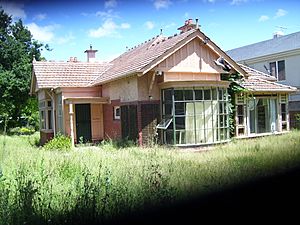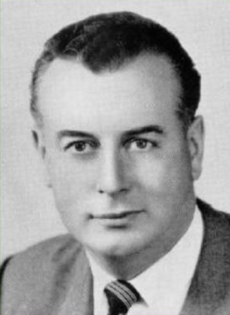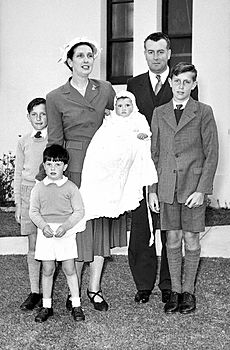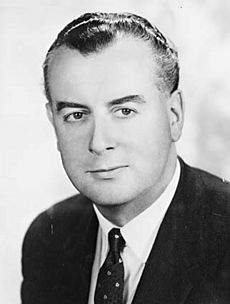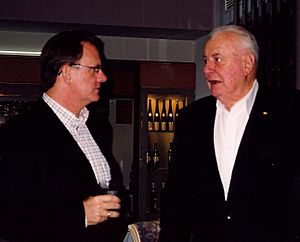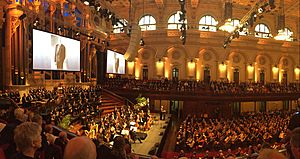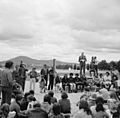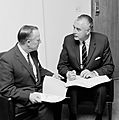Gough Whitlam facts for kids
Quick facts for kids
Gough Whitlam
|
|
|---|---|
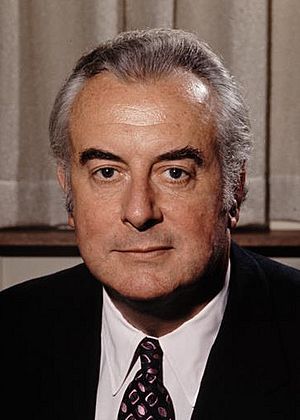
Official portrait, 1972
|
|
| 21st Prime Minister of Australia | |
| In office 5 December 1972 – 11 November 1975 |
|
| Monarch | Elizabeth II |
| Governor-General |
|
| Deputy |
|
| Preceded by | William McMahon |
| Succeeded by | Malcolm Fraser |
| Leader of the Opposition | |
| In office 11 November 1975 – 22 December 1977 |
|
| Prime Minister | Malcolm Fraser |
| Deputy |
|
| Preceded by | Malcolm Fraser |
| Succeeded by | Bill Hayden |
| In office 9 February 1967 – 5 December 1972 |
|
| Prime Minister |
|
| Deputy | Lance Barnard |
| Preceded by | Arthur Calwell |
| Succeeded by | Billy Snedden |
| Minister for Foreign Affairs | |
| In office 5 December 1972 – 6 November 1973 |
|
| Prime Minister | Himself |
| Preceded by | Nigel Bowen |
| Succeeded by | Don Willesee |
| Leader of the Labor Party | |
| In office 9 February 1967 – 22 December 1977 |
|
| Deputy |
|
| Preceded by | Arthur Calwell |
| Succeeded by | Bill Hayden |
| Deputy Leader of the Labor Party | |
| In office 7 March 1960 – 9 February 1967 |
|
| Leader | Arthur Calwell |
| Preceded by | Arthur Calwell |
| Succeeded by | Lance Barnard |
| Member of the Australian Parliament for Werriwa |
|
| In office 29 November 1952 – 31 July 1978 |
|
| Preceded by | Bert Lazzarini |
| Succeeded by | John Kerin |
| Personal details | |
| Born |
Edward Gough Whitlam
11 July 1916 Kew, Victoria, Australia |
| Died | 21 October 2014 (aged 98) Elizabeth Bay, New South Wales, Australia |
| Political party | Labor |
| Height | 6 ft 4 in (194 cm) |
| Spouse |
Margaret Dovey
(m. 1942; died 2012) |
| Children | 4, including Tony and Nicholas |
| Parent |
|
| Relatives |
|
| Education |
|
| Alma mater | University of Sydney |
| Occupation |
|
| Signature | |
| Military service | |
| Branch/service | Royal Australian Air Force |
| Years of service | 1941–1945 |
| Rank | Flight lieutenant |
| Unit | No. 13 Squadron |
| Battles/wars | World War II |
Edward Gough Whitlam (11 July 1916 – 21 October 2014) was the 21st prime minister of Australia. He served from 1972 to 1975. He was the leader of the Australian Labor Party (ALP) for a long time. His government brought in many new ideas and changes. These changes aimed to make society fairer. His time as prime minister ended when the governor-general of Australia, Sir John Kerr, removed him from office. This happened during a big political event in 1975. Whitlam is the only Australian prime minister to have been removed from office in this way.
Contents
Early Life and Education
Edward Gough Whitlam was born on 11 July 1916. His family home was in Kew, Victoria, a suburb of Melbourne. He was the older of two children. His sister, Freda Whitlam, was born four years later. His father, Fred Whitlam, was a government worker. He later became a top lawyer for the government. His father's work on human rights greatly influenced Gough. From a young age, he was called Gough. This was his middle name.
In 1918, his family moved to Sydney. They lived in Mosman and then Turramurra. Gough started school at age six. He attended Mowbray House School and Knox Grammar School.
In 1927, his father got another promotion. This meant the family moved to Canberra, the new capital city. Gough was the only prime minister to grow up in Canberra. He went to Telopea Park School. In 1932, he moved to Canberra Grammar School. There, he received a prize from the Governor-General, Sir Isaac Isaacs.
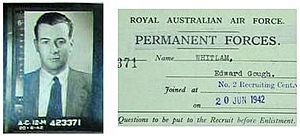
At 18, Whitlam started at the University of Sydney. He studied classics and then law. He had thought about being a professor. But his grades were not high enough for that.
Military Service in World War II
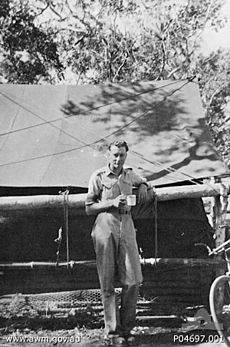
When World War II started in 1939, Whitlam joined the army reserves. In late 1941, he joined the Royal Australian Air Force (RAAF). In 1942, he married Margaret Elaine Dovey. She was a swimmer who had competed for Australia.
Whitlam trained as a navigator and bomb aimer. He flew Lockheed Ventura bombers with No. 13 Squadron RAAF. He reached the rank of Flight lieutenant. While in the RAAF, he became interested in politics. He helped the Australian Labor Party in the 1943 election. He also supported a plan to give the federal government more power. This plan was not approved. In 1961, Whitlam said this made him want to change the Australian Constitution. He joined the Labor Party in 1945. He left the RAAF in October 1945. After the war, he finished his law studies. He became a lawyer in 1947.
Political Career
Whitlam was first elected to the Australian House of Representatives in 1952. He became a Member of Parliament (MP) for the area of Werriwa. In 1960, he became the deputy leader of the Labor Party. In 1967, he became the leader of the party. This made him the Leader of the Opposition. After losing the 1969 election, Whitlam led Labor to victory in the 1972 election. This ended 23 years of the other main parties being in power.
Prime Minister (1972–1975)
The Whitlam government brought in many new policies. They ended military conscription and Australia's part in the Vietnam War. They started universal health care and free university education. They also created programs for legal aid.
His government's second term faced economic problems. The world was going through an oil crisis and a recession. There was also a political problem called the Loans affair.
In late 1975, the opposition in the Senate stopped money bills from passing. This meant the government could not get the money it needed. The opposition wanted the government to hold an election. Whitlam refused, saying his government had the support of the House of Representatives. The crisis ended in November. The Governor-General, Sir John Kerr, removed Whitlam from office. He then asked the opposition leader, Malcolm Fraser, to be the temporary prime minister. Labor lost the next election by a lot.
Whitlam stepped down as party leader after losing the 1977 election. He left parliament the next year. When Labor won the election in 1983, he became Australia's Ambassador to UNESCO. He did a great job in this role. He stayed active even into his nineties.
Later Years and Passing
Whitlam received a high honour, the Companion of the Order of Australia, in June 1978. He left Parliament on 31 July that year. He then worked in different academic roles. When the Labor Party returned to power in 1983, Whitlam became Australia's ambassador to UNESCO in Paris. He worked there for three years. He defended UNESCO against claims of corruption. After his time as ambassador, Whitlam was elected to UNESCO's Executive Board.
In 1987, Whitlam became chairman of the National Gallery of Australia. He and Margaret Whitlam helped Sydney win the bid to host the 2000 Summer Olympics in 1993.
Sir John Kerr, the Governor-General who dismissed him, died in 1991. Whitlam always saw his dismissal as a "constitutional coup". Whitlam and Malcolm Fraser, who became prime minister after him, became friends later on. They never talked about the events of 1975.
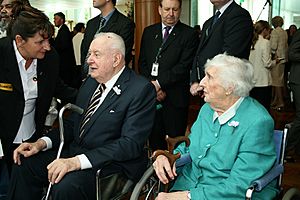
On 21 January 2009, Whitlam became the oldest living former prime minister of Australia. He passed away on the morning of 21 October 2014. His family announced there would be a private cremation and a public memorial service. He was Australia's longest-lived Prime Minister, living to be 98 years and 102 days old. Seven Australian prime ministers attended his funeral.
Memorials
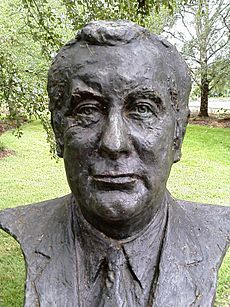
A special memorial service was held on 5 November 2014. It took place at the Sydney Town Hall. Many people spoke about Whitlam's life and work. These included Cate Blanchett and Noel Pearson. Music was played by William Barton and Paul Kelly. The Sydney Symphony Orchestra also performed. At the end, four RAAF F/A-18 Hornets flew past in a special formation. Many important people attended the service. Thousands more watched it on screens outside the hall and on TV.
To honour Whitlam, a new area for elections was named the Division of Whitlam. This happened before the 2016 election. A future suburb in Canberra will also be named after him. Gough Whitlam Park in Earlwood, New South Wales, is also named after him.
In 2021, Whitlam's former home in Cabramatta was sold. A group of Labor supporters bought it. They plan to restore the house and turn it into a museum. This will help people learn about Whitlam. The "Whitlam Prime Ministerial Home" officially opened on 2 December 2022.
Published Works
- On Australia's Constitution (1977)
- The Truth of the Matter (1979)
- The Whitlam Government (1985)
- Abiding Interests (1997)
- My Italian Notebook: The Story of an Enduring Love Affair (2002)
Images for kids
-
Whitlam speaking at the Aboriginal Tent Embassy, February 1972
-
Whitlam visits US President Richard Nixon, July 1973
-
The Suharto-Whitlam House in Dieng Plateau, Indonesia, where Whitlam discussed the future of East Timor with Indonesia's President Suharto in 1974
-
A huge ALP rally overspills The Domain in Sydney, 24 November 1975.
See also
 In Spanish: Gough Whitlam para niños
In Spanish: Gough Whitlam para niños


